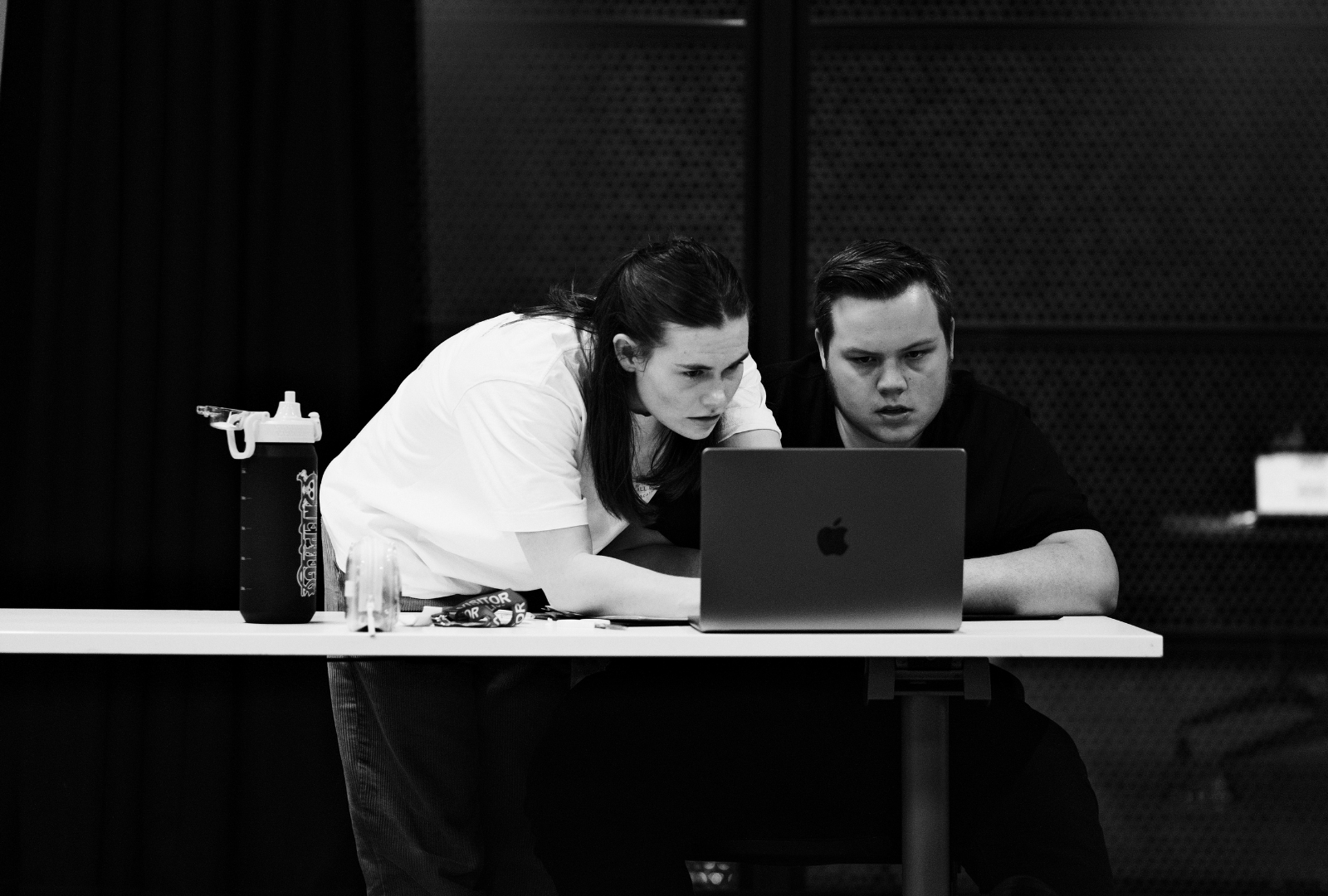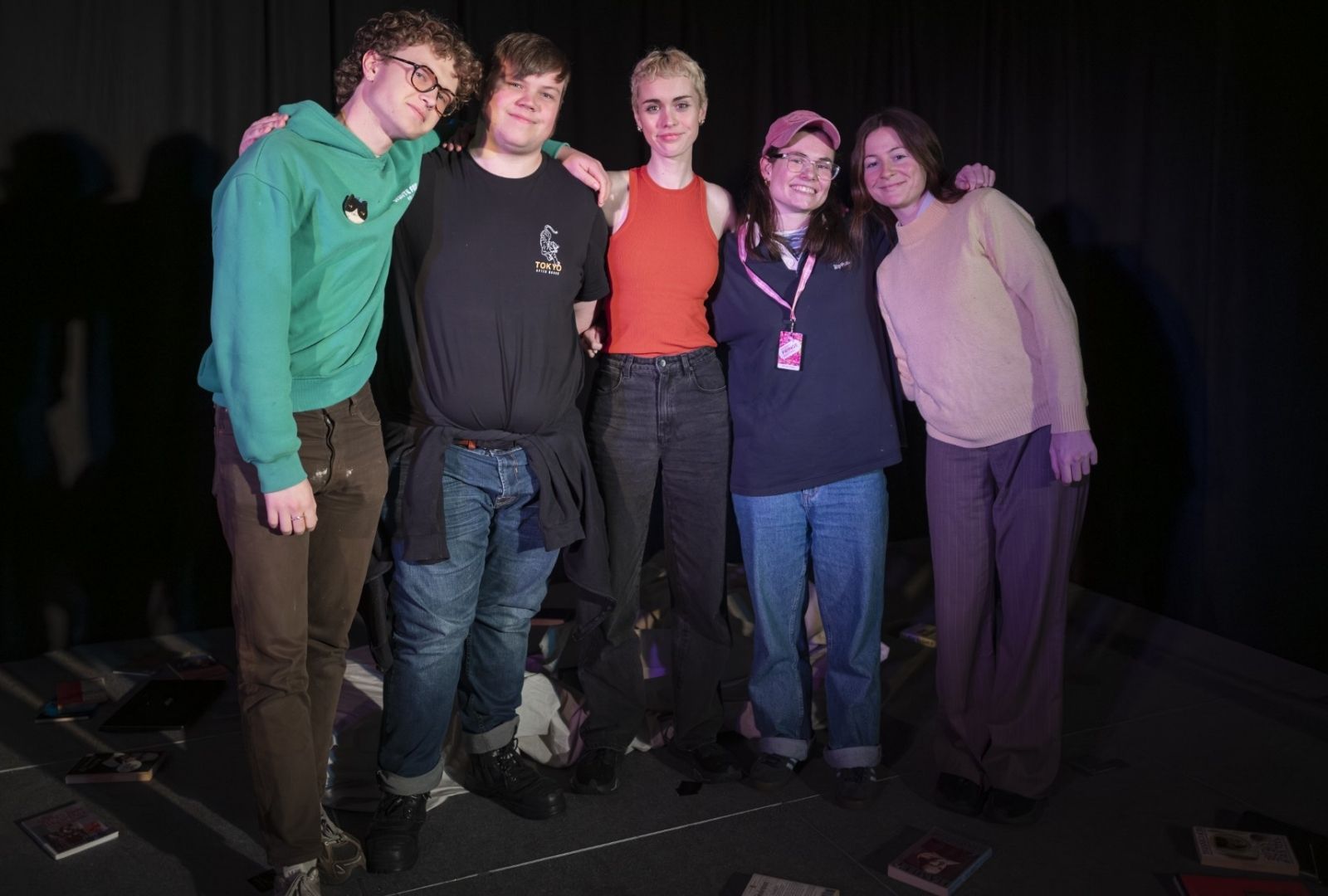Gia Ophelia is a story that takes aim at sexism and ageism in the arts while exploring motherhood, infertility and the battle for identity as both an aging woman and artist who just wants to play Ophelia one last time. Making it’s debut at Sydney Fringe Festival this year, we spoke to Stage Manager, Luke McGilvray (Live Production and Technical Services, 2024) and Assistant Producer, Bianca Watkins (Writing for Performance, 2024) about their behind-the-scenes roles on this darkly comic new work and the experience of collaborating with fellow NIDA alumni.
Luke McGilvray – Stage Manager (Live Production and Technical Services 2024):
As Stage Manager, you’re central to bringing the practical and creative elements of this one-woman show together. What opportunities and challenges has Gia Ophelia presented for you?
When I joined the team for the show alongside Jo Bradley (Directing, 2024), I began by taking over the scheduling for the rehearsal period, which was a first for me. On previous projects, by the time that I had joined or from the start of the production process, the scheduling was done by either the producers or directors, and they preferred that. I did initially find it difficult due to the specificity that was necessary for it, and I initially forgot some of the finer, though still important, details.
I think that, the same way actors train the skill of acting like a muscle, so too do stage managers need to practise being hyper-focused and multitasking regularly. Scheduling as well as the rehearsal reports needed to be specific due to the writer being in Queensland, and I found Gia Ophelia challenged me to take my stage management skills to a higher level than I have previously needed and helped me grow my previous skills and, simultaneously, learn new ones.
What do you hope audiences walk away with thinking or feeling after seeing this production?
The two main points that I find particularly poignant in the show are the way that we digest theatre and of the experience of women. I think you should really, really think about the realities that are reflected in theatre and though analysing is a way that people do enjoy reading plays, such as Shakespeare, that is not the only way that theatre should be digested, and it can de-humanise the characters and ultimately diminish the comments on humans that the show is making.
Finally, I find that one of my favourite parts of theatre is the opportunity to learn about other people’s experiences that we would otherwise not know about. As a man, I found the discussion around infertility and the experiences/perceptions of women was not a conversation that had come up before in my life, and I am grateful that I was able to spend so much time with the text and learn about the reality that some women face.

What has it been like working so closely with other NIDA graduates, and how does that shared training influence the way you collaborate?
I think that when it comes to independent theatre, there is such a variety of people from so many different backgrounds coming together to make theatre; therefore, there are always some initial moments when working on a production of figuring out everyone’s experience level and knowledge. I found that even from the beginning of the process, we all understood both the higher standard of professionalism and ultimately efficiency that governed the production process. I think this is evident in both the directing and the acting in the show, which is of such a superb quality for the shorter period we had to rehearse and tech the show.
What advice do you have for anyone applying for the Diploma of Live Production and Technical Services (DLPTS)?
I did DLPTS without much/any prior knowledge when it came to lighting, sound or technical theatre, really, and I was genuinely surprised that I even got accepted. But, alas, I showed my passion and desire to grow in my knowledge and skills by asking lots of questions and taking any/all opportunities to learn as many new things as I could get my hands on. So, simply put, just show them that you are willing to work hard, learn hard and are passionate about making great theatre. And don’t be afraid to admit you don’t know something, too; just be open to learning new things.
Bianca Watkins – Assistant Producer, (Writing for Performance 2024):
What drew you to this particular production and what are you most excited for audiences to see?
My own creative practice tends to centre the perspective of women in storytelling, where both experience and aesthetic are explored and sometimes even made to feel like a character in itself. Gia Ophelia really anchors into how brutal the roles forced upon women can be, especially when you’re an actor, in the business of taking on roles. I’ve been thinking a lot lately about how it feels as though there aren’t enough strong acting roles for women out there, or scenes between two where they’re talking about anything other than their male love interests (most of my favourite films do fail the Bechdel Test, I’ll admit).
It’s so amusingly bleak that one actress’ highest aspiration might be to play the part of Ophelia. Ophelia might be the most famous of Shakespeare’s ladies, but she’s also definitely one of the worst off. Not exactly an ideal role model. But then, Grace Wilson’s writing explores the nuance, validity and honesty behind our dreams. I’m excited for audiences to hold that in the room with us, and to see Annie’s performance sparkle through this meta storytelling.
How has working behind the scenes on this project expanded your perspective on storytelling and theatre-making?
As an emerging writer myself, it’s been both interesting and enriching to better understand the cogs that turn to get up new work in Sydney. I’ve usually been on the other side of the page, but understanding the greater machine of independent theatre has made me feel excited about supporting other emerging artists, to help them realise their vision.

What has been the most rewarding part about collaborating with this team?
Being in the rehearsal room the times that I have; late night weariness that turns into silliness and post-run-through afterglow in Annie’s face. Those are the highlights: seeing all the hard work everyone in my team has been putting in. Jo Bradley (Directing, 2024), Otto Zagala (Technical Theatre and Stage Management student), Annie Stafford (Acting, 2016) and Luke McGilvray (Live Production and Technical Services, 2024) have created a beautiful piece of theatre out of Grace’s words.
Gia Ophelia is playing from 2 – 6 September at Erskineville Town Hall. Book tickets.
Header image: Annie Stafford (Acting, 2016) in Gia Ophelia. Photo by Patrick Phillips.
